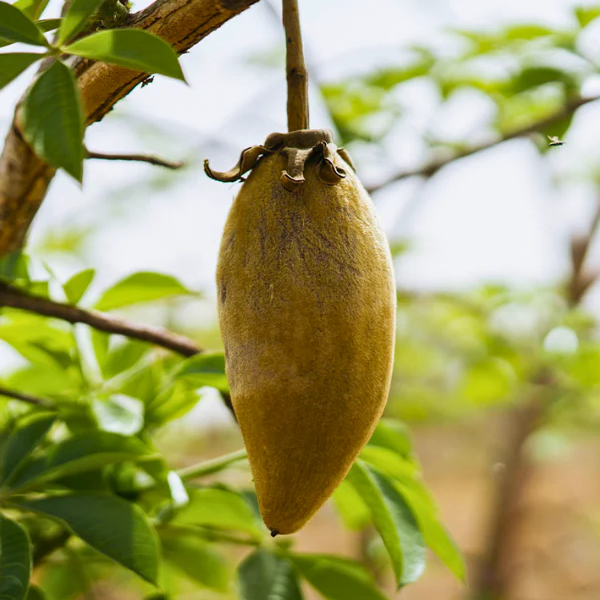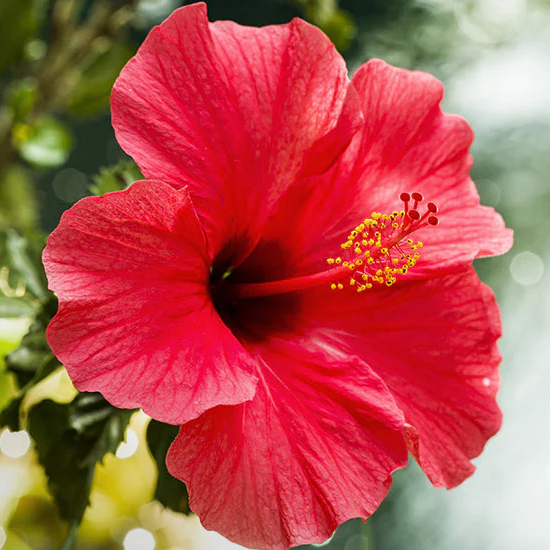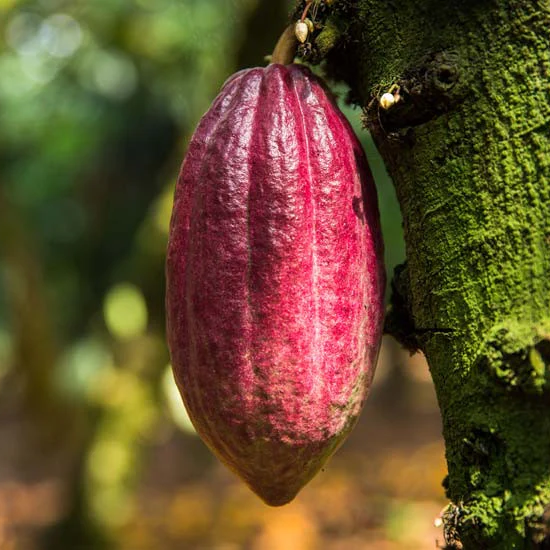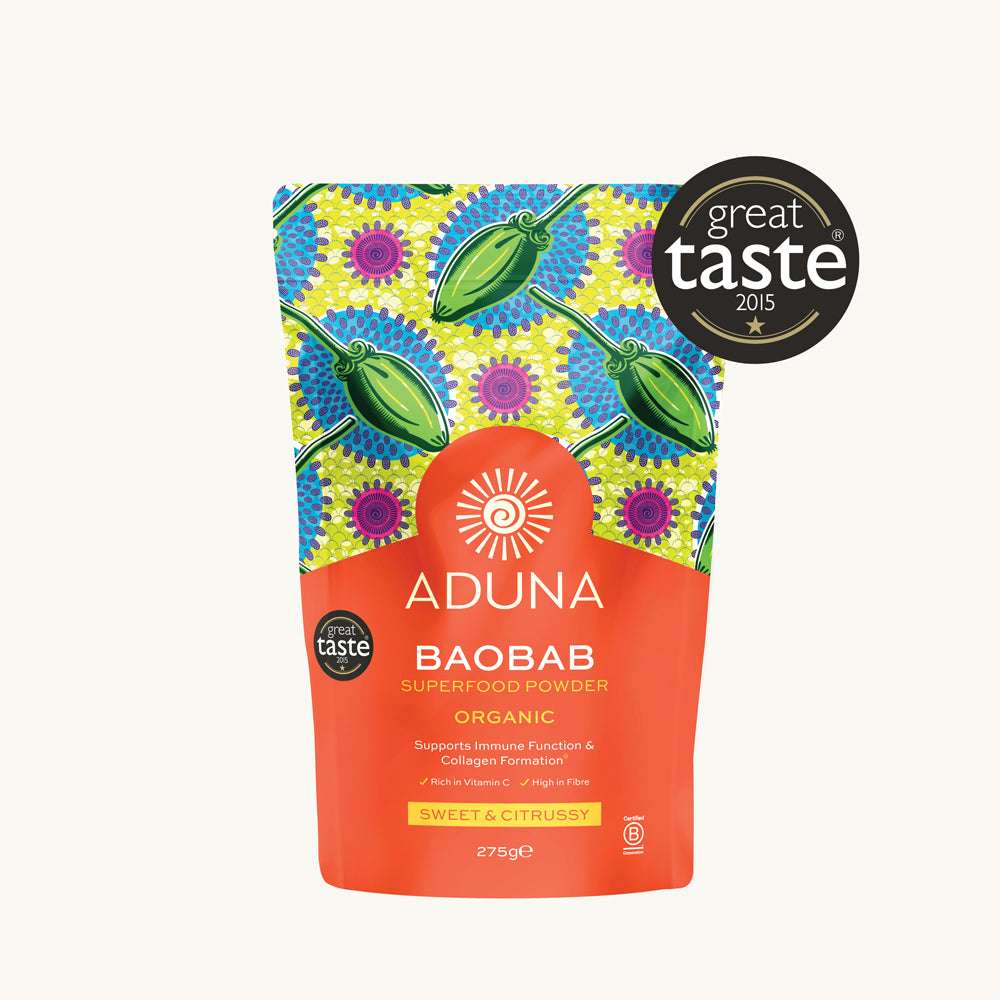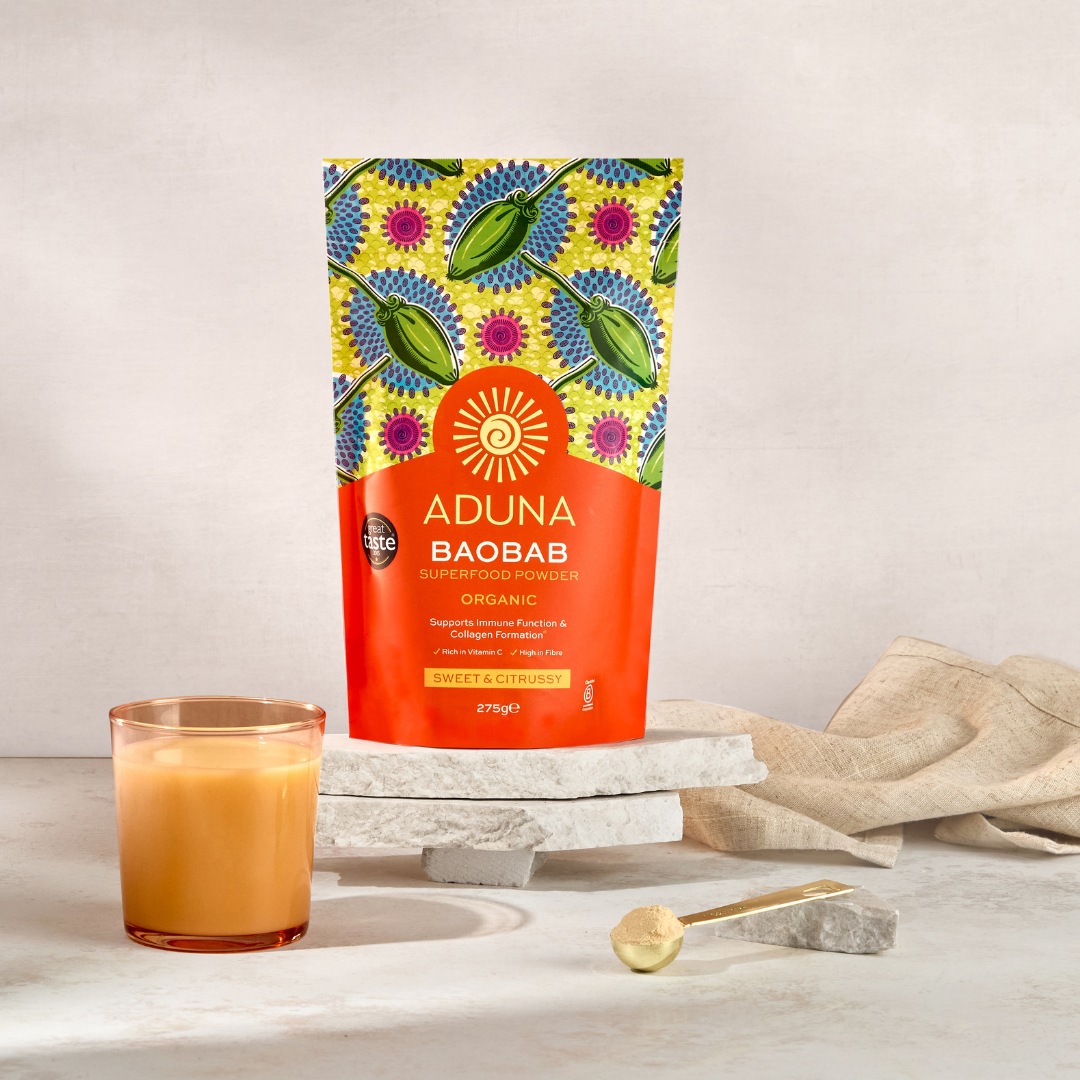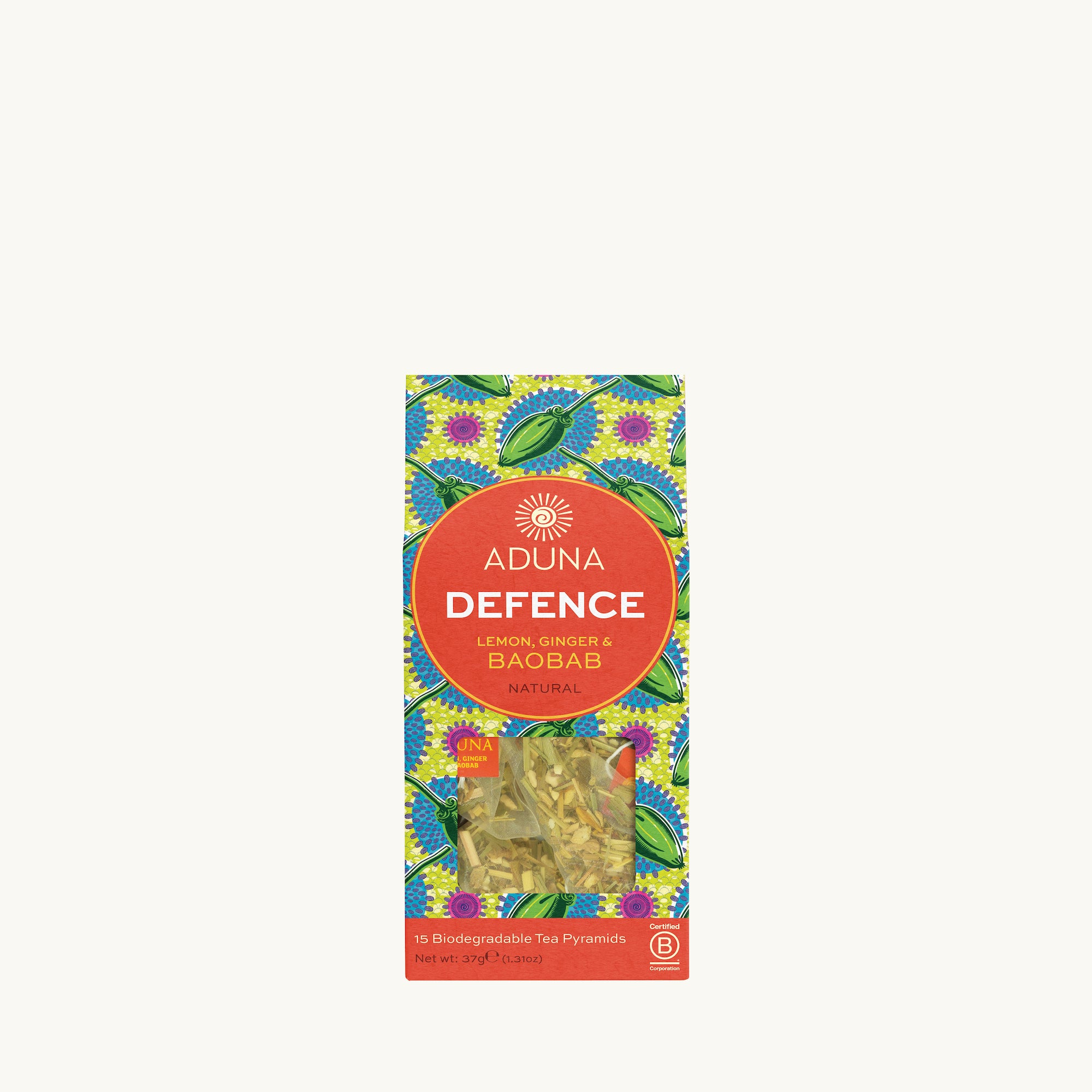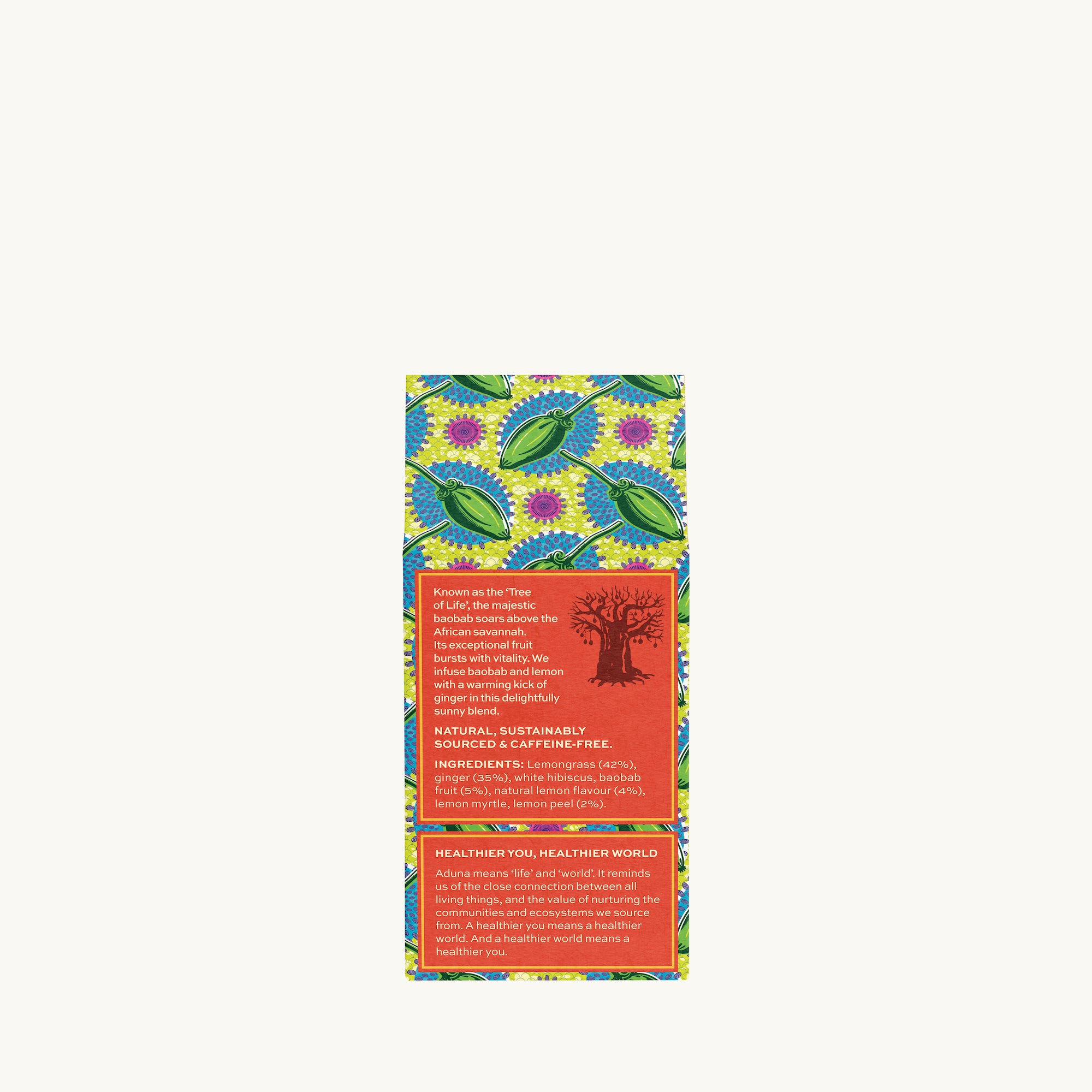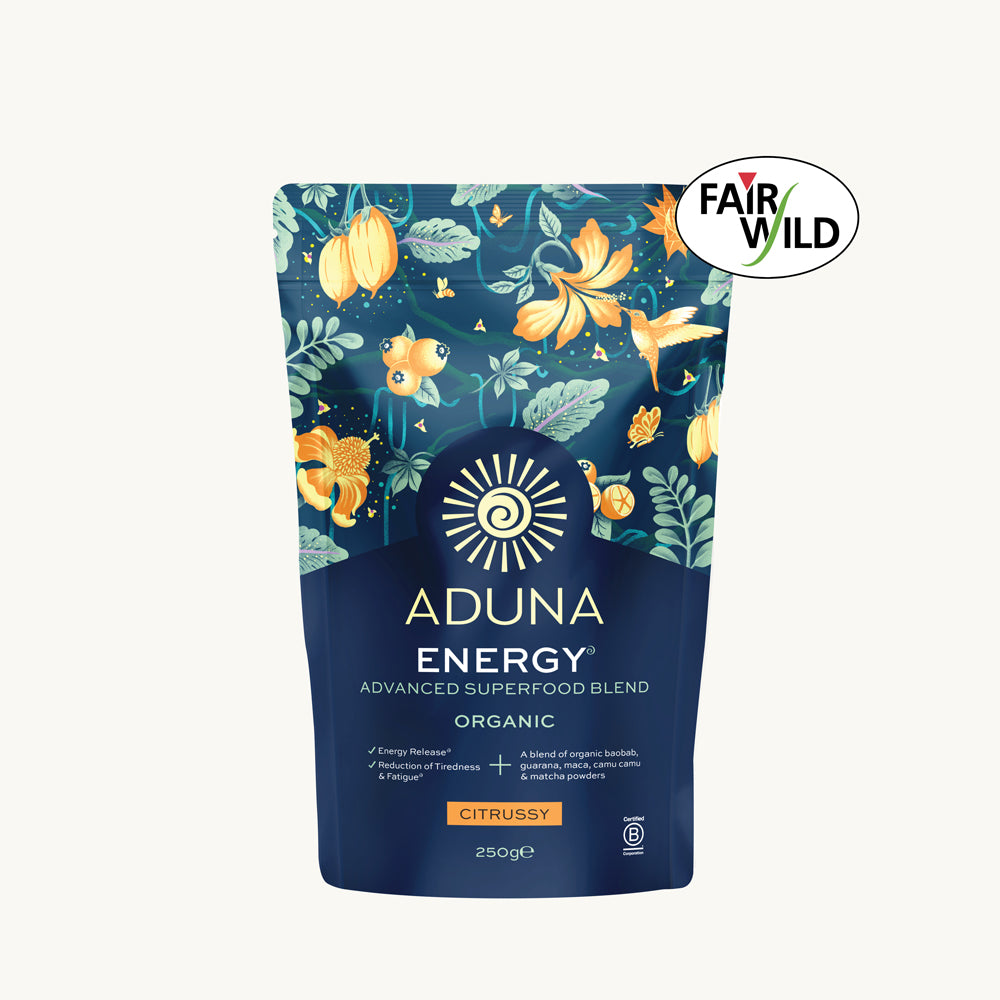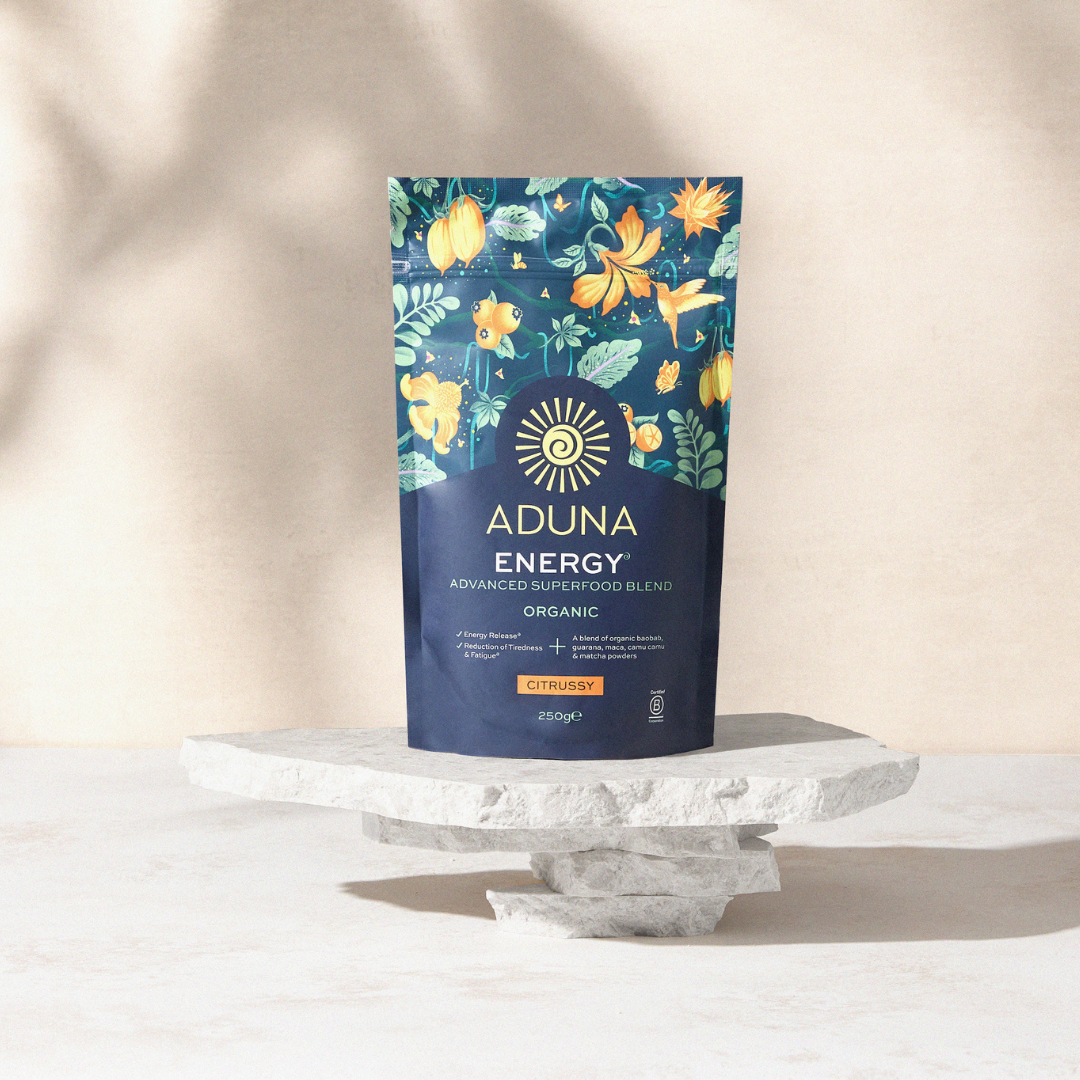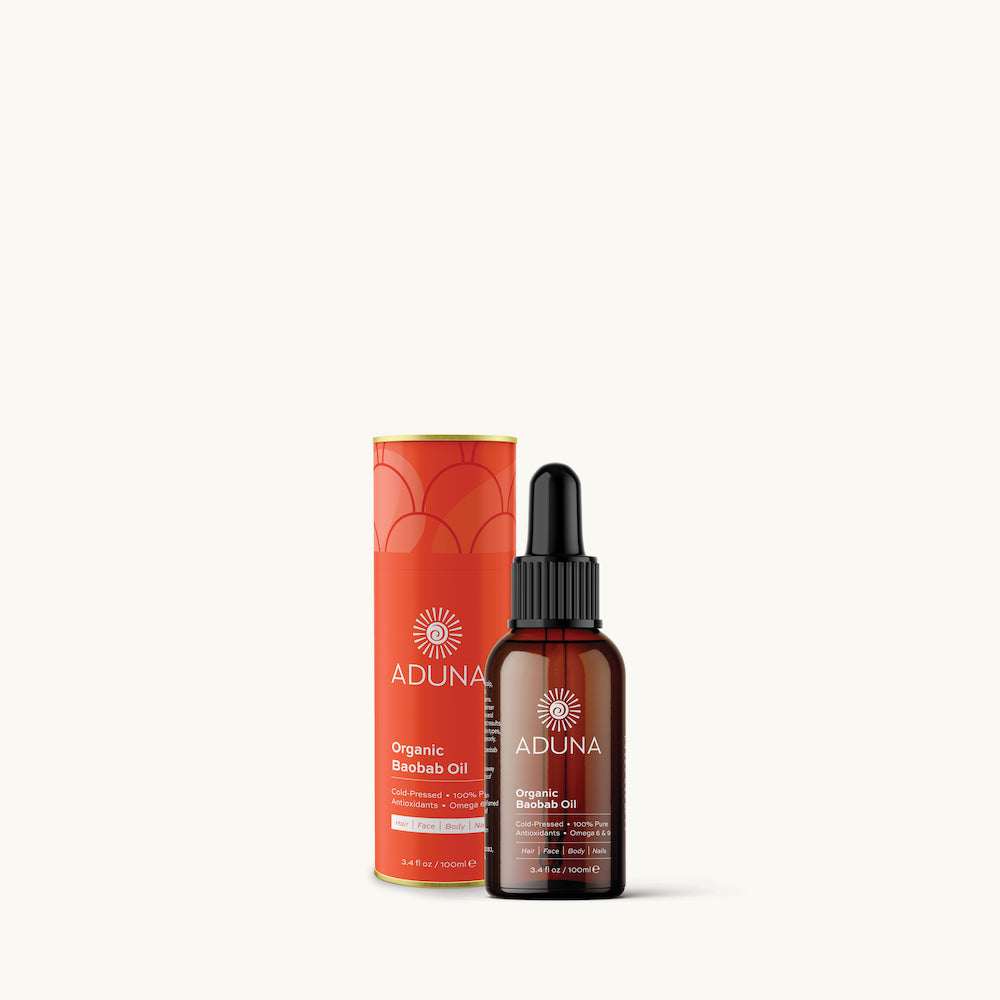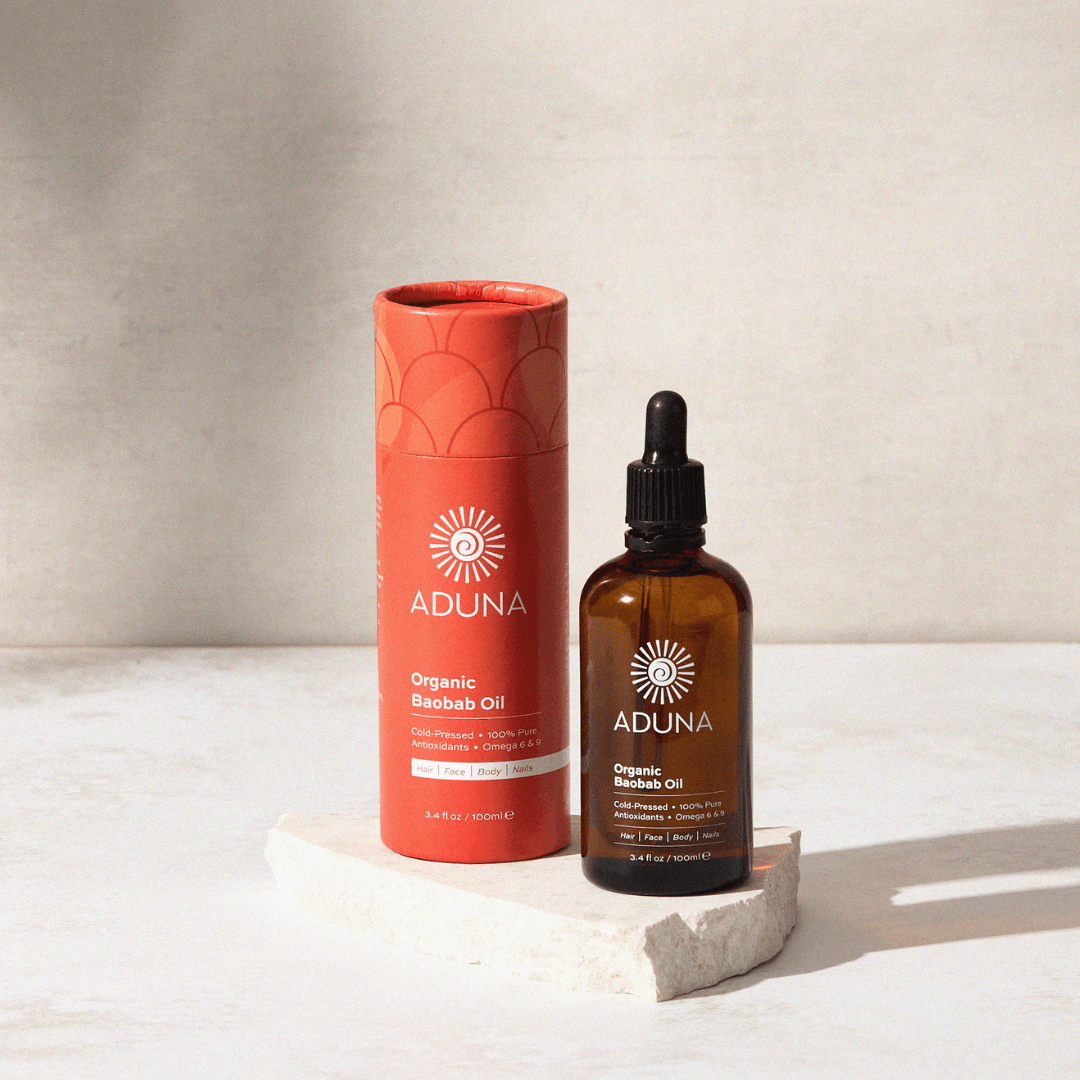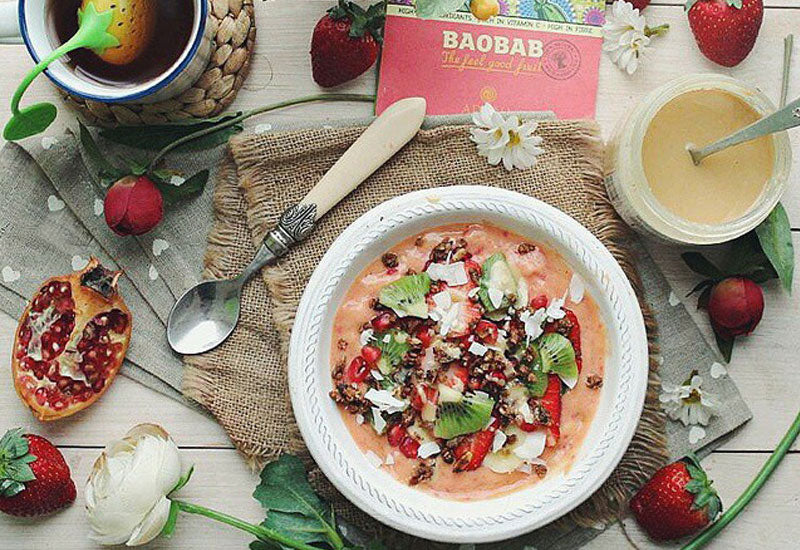Baobab is the exceptional superfruit of Africa's 'Tree of Life'. It is the only fruit in the world that dries naturally on the branch. Baking in the sun for 6 months, baobab’s prickly green, furry coating transforms into a smooth brown, coconut-like shell. Inside it’s hard casing (we use a hammer to crack it open) the pulp is naturally dehydrated. We simply harvest and sieve to produce a 100% natural and organic superfood powder that is exceptionally nutrient-rich, providing a wide range of health benefits.
Baobab powder is a rich source of vitamin C, which contributes to normal:
- Energy release
- Immune function
- Healthy, glowing skin
It is also almost 50% fibre (two thirds soluble and one third insoluble, making it a powerful prebiotic) and contains more antioxidants than any other whole fruit.
As it is a natural source of these nutrients, it is more bioavailable than manufactured vitamin supplements, meaning our bodies can absorb the nutrients more easily, ensuring a greater uptake.
Amazingly, baobab has a natural shelf-life of 3 years so there are no additives or preservatives added to our products, just 100% pure baobab fruit pulp powder. It also has a delicious sweet and citrussy flavour - a bit like zingy sherbet!
The top health & beauty benefits of baobab
1. Immune system
The human body cannot make or store its own vitamin C (unlike other animals), so we need to make sure we get a good supply from the foods we eat every day.
A single serving of Baobab Powder (10g or 2-3 teaspoons) provides:
- 33% of your daily vitamin C requirement (NRV)
One of the key benefits of vitamin C is that it helps to keep our immune system strong, supporting our body’s defence against viruses, infections, diseases and other illnesses. Try shaking baobab powder into your orange juice or water bottle for an extra dose of vitamin C on-the-go!
2. Slow energy release
We know what you’re thinking... ‘slow? I need energy fast!’. Vitamin C contributes to normal energy release – this slow, and steady release sustains us for a longer period of time and prevents us from feeling tired all of a sudden. Therefore, it helps the reduction of tiredness and fatigue as well as supporting a normal energy-yielding metabolism which is “needed for all functions and activities of the body, including physical activity and exercise” (EFSA, 2012).
Sub your morning coffee for a sprinkle of baobab powder on your breakfast to keep you energised and awake throughout the day. We like ours stirred into porridge or blended into our morning smoothies.
3. Blood sugar
Aduna Baobab Powder contains 34% soluble fibre, this helps to slow down the release of sugars into the blood stream, reducing energy spikes. Soluble fibre can also help to control blood glucose levels, improve blood cholesterol and reduce visceral fat (body fat that is stored around the organs in your abdominal).
The Functional Food Centre of Oxford Brookes University conducted a trial using Aduna Baobab Powder and found that human participants who consumed a milk containing baobab had a lower blood glucose response than those who had a control drink with no baobab.
A later study by Oxford Brookes University also showed that baobab significantly reduced the rate at which sugar was released into the blood after digestion. As such, baobab is considered ideal for those following a low GI diet. It could also be beneficial for people with Type 2 Diabetes. Read more about baobab and blood sugar here.
Add Aduna Baobab Powder into your juices to help slow down the release of fruit sugars into your blood stream.
4. Absorption of iron
Over 30% of the world’s population are deficient in iron – making it the most common nutritional disorder (World Health Organisation, 2017). Many turn to various iron supplements to increase their intake (we like to use Moringa Powder as a natural alternative). A less known fact is that vitamin C is needed to help the body absorb iron so pairing iron with vitamin C actually increases absorption.
Our bodies can obtain iron from two sources; heme iron (found in fish, poultry and red meat) and nonheme iron (present in plant foods, eggs, milk and meat). Compared to the former, nonheme iron is not easily absorbed by the body.
As baobab is a rich natural source of vitamin C, it is easily accessible to the body and is better absorbed than artificial supplements. Sprinkle some baobab onto your iron-rich foods for a lemony zing or shake it into your water when taking your iron supplements.

5. Digestive health
Approximately 40% of people have at least one digestive symptom at any one time (NHS, 2016). Despite the growing awareness of the role of fibre in improving our digestive health, 80% of people in the UK don’t eat enough of it.
Aduna Baobab Powder is almost 50% fibre. There are two types of fibre that our body needs: soluble and insoluble - and baobab contains both. Soluble fibre dissolves in the water found in your digestive system and can help to reduce the level of cholesterol in your blood.
Insoluble fibre doesn’t dissolve, it passes through your gut and enables other foods to move through your digestive system easily. It also helps to keep your bowels healthy and prevents digestive problems.
Try adding Aduna Baobab into your daily meals to get your fibre fix, this Red Lentil & Baobab Curry is one of our favourite baobalicious recipes.
6. Prebiotic / gut health
Most people are familiar with probiotics – good bacteria found in foods such as yoghurt, kefir and kimchi which have beneficial effects to your health, particularly your digestive system. However, very few are familiar with prebiotics which play an equally important role in gut health. Prebiotics are indigestable dietary fibres, also known as soluble fibres, made up of non-living organic matter.
The soluble fibers of baobab fruit pulp are prebiotics: non-digestible food components that beneficially affect the host by selectively stimulating the growth and activity of beneficial microflora (Journal of Food Research, 2016).
It’s these prebiotic qualities that could explain how baobab might just be the secret to having the world’s healthiest gut. Studies of the Hadza Tribe in Tanzania, some of the planet's last remaining hunter gatherers, found they have 40% more diverse gut microbiomes than the average Westerner! “According to scientists, the Hadza have the most diverse gut bacteria of anyone anywhere in the world” (Independent, 2017). One of their key staples? That’s right you guessed it – the baobab fruit. Could eating baobab explain why the Hadzas have such good gut health?
The benefits of including prebiotics in your diet don’t stop there, a study by the University of Colorado Boulder suggested that prebiotics can improve sleep after a stressful event, suggesting that adding baobab into your diet can also help support a good night’s sleep.
For best results, it is recommended you take prebiotics with probiotics – we like to mix our baobab with yoghurt to keep our gut health in check, or do like the Hadza’s do and stir it into a traditional milky beverage.
7. Radiant skin
According to The Journal of Nutrition, Baobab has the highest antioxidant content of any fruit. Baobab powder has twice the antioxidants gram per gram of goji berries and more than blueberries and pomegranates combined. Learn more about why we need antioxidants here.
Baobab is packed with antioxidants and vitamin C which supports collagen formation - helping to give you radiant, glowing skin as well as preventing wrinkles.
In fact, baobab's skin benefits are so impressive that Aduna Baobab was the first ever food item to be sold in the beauty halls of prestigious London department store Liberty where it is listed as “must-have” thanks to its exceptional beauty from within properties. Read more about baobab’s super-skin benefits here.

8. Pregnancy
It is generally advised that pregnant women should consume 85mg of vitamin C per day (a 10g serving of Aduna Baobab Powder contains 26mg) as it helps the body produce collagen. Collagen is a structural protein that is needed for your baby’s normal growth during pregnancy. It plays a vital role in structuring a baby’s body and supporting their developing organs.
Vitamin C, also known as ascorbic acid, helps your body fight infections and protects cells from damage – helping to keep you healthy. Another key role that vitamin C plays during pregnancy is its ability to increase the absorption of iron – a vitamin that most pregnant women are deficient in. Iron is needed to help our bodies produce red blood cells which carry oxygen around the body and to the baby.
If that wasn’t enough to convince you of baobab’s super-powers, it is also a good source of fibre. Nutritional Therapist, Eve Kalinik explains how this helps to “support bowel movements and a great addition for new mums to help fight fatigue that comes with having a newborn” (read more about baobab and pregnancy here).
9. Alkaline
Baobab is considered to be one if the highest alkaline foods available as it has a PRAL (Potential Renal Acid Load) rating of -52. Eating highly alkaline foods helps to balance our body’s pH levels.
The Journal of Environmental Health (2012) found that alkaline foods can also help defend our bodies from chronic diseases and ailments (such as hypertension, arthritis and deficiency in vitamin D). Have you tried adding Aduna Baobab to your green juices?
10. Pre/post work out
Physical exercise increases oxidative damage to cells and muscle tissues so it’s important to increase your intake of vitamin C to reduce its negative effects. This is supported by a study conducted by the University of North Carolina (2006) who found that participants taking doses of vitamin C before exercise and for 4 days after reported less muscle soreness compared to the group who took a placebo.
Another study by the University of Birmingham found that volunteers who took vitamin C exhibited 75% more post exercise recovery than those who consumed vitamin E or a placebo. It’s no wonder celebrity personal trainer Dalton Wong loves shaking baobab powder into his protein shakes!
Shop the Aduna Baobab range:
- Aduna Baobab Powder - 100% organic fruit powder with a delicious sweet and citrussy flavour. Perfect for boosting smoothies, juices and sprinkling on your breakfast. From £5.99 for 80g.
- Aduna Lemon, Ginger & Baobab Super Tea - 100% organic, our Defence Super Tea blends whole pieces of dried baobab fruit with lemongrass, ginger and hibiscus, all of which are known to enhance energy, vitality and general wellbeing in the body.
Buy online today and receive free delivery on all orders over £35 in the UK and £75 internationally. Sign up to our newsletter and receive a 15% off discount code direct to your inbox.
Or visit our store locator to find your nearest retailer (we sell in 18 countries around the world).
Sourced directly from small-scale producers, every purchase of Aduna Baobab contributes to the creation of sustainable income flows for women in rural Ghana. Learn more about the social impact of baobab here.
Read more baobab benefits:
The super-skin benefits of Aduna Baobab Superfruit Powder - International Facialist Abigail James
"Improve your digestion and re-boost your body with this super supplement" - Get The Gloss
Baobab: the perfect superfood for pregnant and new mums
Sources:
Health Claims: EU Register on Nutrition and Health Claims
Antioxidants: The Antioxidant Food Table, Carlsen M.H et al, 2010, Journal of Nutrition, 9:3
Vitamin C: An Overview of The characteristics and Function of Vitamin C in Various Tissues: Relying on its Antioxidant Function, Akbari, A et al, 2016.
The Alkaline Diet, Schwalfenberg,G., 2012, The Journal of Environmental Health.
Vitamin C & Muscle Function: Effect of antioxidant vitamin supplementation on muscle function after eccentric exercise, Jakemanl, P. and Maxwell, S., 1993, European Journal of Applied Physiology and Occupational Physiology.
Nutritional Quality and Functional Properties of Baobab (Adansonia digitata) Pulp From Tanzania. Journal of Food Research; Vol. 5, No. 5; 2016.
Prebiotics & Sleep: Dietary Prebiotics and Bioactive Milk Fractions Improve NREM Sleep, Enhance REM Sleep Rebound and Attenuate the Stress-Induced Decrease in Diurnal Temperature and Gut Microbial Alpha Diversity,Thompson, R., et al, 2016.

